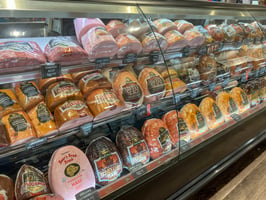A recent outbreak of Listeria monocytogenes has caused 43 illnesses and three deaths across...
10 Year Listeria Outbreak Linked to Hispanic-style Cheeses
 A multistate outbreak involving queso fresco and cotija cheeses contaminated with Listeria monocytogenes has been linked to twenty six illnesses and two deaths occurring as far back as 2014. Previous epidemiological investigations by CDC in 2017 and 2021 identified queso fresco and similar cheeses as a potential source for this outbreak, but there was not enough information to identify a specific brand until now. Sampling and testing of product in January 2024 by the Hawaii State Department of Health’s Food and Drug Branch found a package of cotija cheese testing positive for L. monocytogenes. Analysis of the isolate with whole genome sequencing (WGS) revealed it was the same strain of L. monocytogenes that was associated with similar cheeses causing illness as far back as 2014. A subsequent FDA onsite inspection at the current cotija cheese manufacturing facility found an environmental sample that tested positive for L. monocytogenes. The environmental isolate was confirmed by WGS to match the product isolate implicated in the current outbreak. Hispanic-style cheeses have a history of association with outbreaks caused by L. monocytogenes. The following table shows several multistate outbreaks over a seven year
A multistate outbreak involving queso fresco and cotija cheeses contaminated with Listeria monocytogenes has been linked to twenty six illnesses and two deaths occurring as far back as 2014. Previous epidemiological investigations by CDC in 2017 and 2021 identified queso fresco and similar cheeses as a potential source for this outbreak, but there was not enough information to identify a specific brand until now. Sampling and testing of product in January 2024 by the Hawaii State Department of Health’s Food and Drug Branch found a package of cotija cheese testing positive for L. monocytogenes. Analysis of the isolate with whole genome sequencing (WGS) revealed it was the same strain of L. monocytogenes that was associated with similar cheeses causing illness as far back as 2014. A subsequent FDA onsite inspection at the current cotija cheese manufacturing facility found an environmental sample that tested positive for L. monocytogenes. The environmental isolate was confirmed by WGS to match the product isolate implicated in the current outbreak. Hispanic-style cheeses have a history of association with outbreaks caused by L. monocytogenes. The following table shows several multistate outbreaks over a seven year
| Year | Cheese Types | Illnesses | Deaths |
| 2021 | Queso Fresco, Quesillo (Oaxaca, string cheese), or Requeson (ricotta) cheeses |
13 | 1 |
| 2015 | Cotija, Fresco, Queso Blanco | 30 | 3 |
| 2014 | Quesito Casero (fresh curd) | 5 | 1 |
| 2014 | Cuajada en Terron (Fresh Cheese Curd) | 8 | 1 |
The connection of the product isolate with an environmental sample from the product manufacturing facility provided evidence that the facility was the source of the current outbreak and that additional products manufactured in the facility at the same time could also be potentially contaminated. This finding led to an extensive recall, that is still ongoing, of at least 117 products from large national retailers. This includes numerous downstream FDA and USDA-FSIS regulated products that used the implicated dairy products as an ingredient in products such as dips, sauces, dressings, yogurt, enchiladas, burritos, street taco kits, bowls, wraps, sandwiches, and salad kits. Large recalls like this can result in supply chain disruptions and product shortages.
In the U.S., Hispanic-style soft cheeses are required to be made from pasteurized milk. Because the milk is pasteurized, L. monocytogenes contamination typically results from prost-process environmental sources or the addition of adulterated ingredients post-process. The FDA provides guidance for the control of L. monocytogenes in ready-to-eat foods.
Additionally, a risk-based supply-chain program adds another level of verification that a supplier has a wellcrafted food safety program. Deibel Laboratories’ advisory services can assist in reviewing food safety plans and providing guidance on appropriate preventive controls where pathogen hazards are identified.


